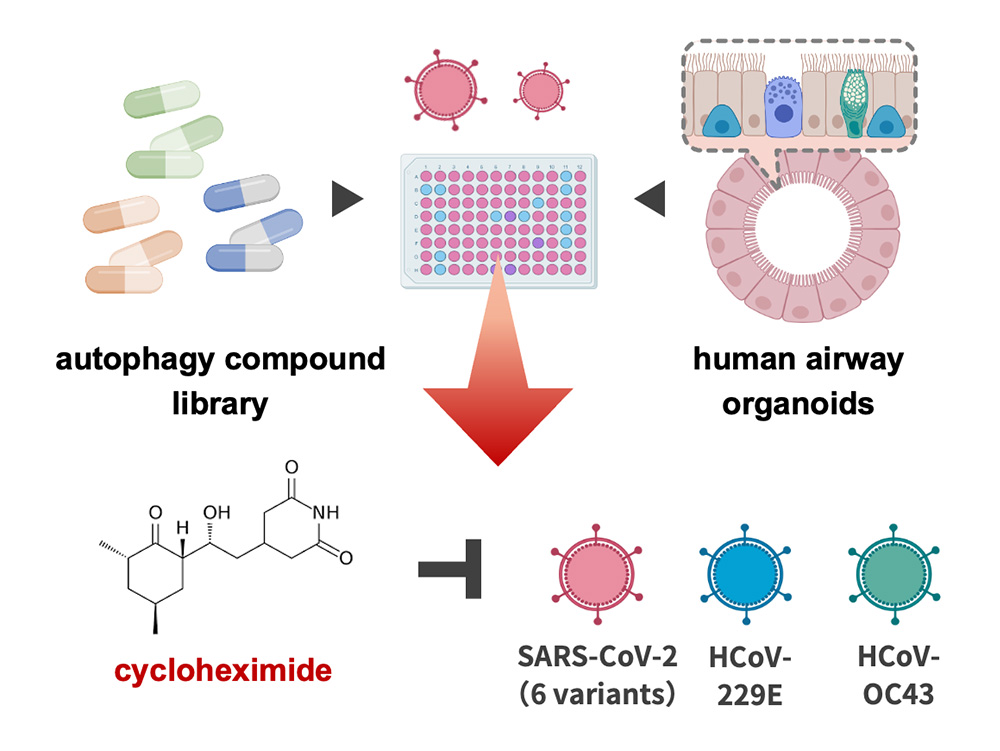
News & Events
News & Events
News
April 13, 2023
Autophagy-related compound screening for the development of COVID-19 therapeutics
Targeting host proteins involved in viral infections is an effective approach for dealing with viruses that mutate rapidly to produce new strains one after another. In this study, the scientists attempted to find COVID-19 therapeutic agents by focusing on autophagy. Autophagy is known to be closely involved with infection by SARS-CoV-2 and its elimination, thus making autophagy-related compounds potential COVID-19 therapeutic candidates.
The research team screened a library of autophagy-related compounds with airway organoids to identify compounds that could control SARS-CoV-2 infection. From the 80 compounds tested, they found cycloheximide and thapsigargin to reduce infection efficiency in a dose-dependent manner.
Because cycloheximide showed greater antiviral efficacy than thapsigargin, they further examined cycloheximide in detail. Cycloheximide also exhibited antiviral activity against six SARS-CoV-2 mutant strains, as well as against human coronaviruses, HCoV-229E and HCoV-OC43, which suggests that cycloheximide has broad-spectrum anti-coronavirus activity. On the other hand, the researchers observed significant toxicity caused by cycloheximide in animal experiments due to its function as a protein synthesis inhibitor.
Takayama believes less toxic derivatives or analogous compounds of cycloheximide that retain their antiviral effects hold great promise if developed in the future. In this study, the team demonstrated the feasibility of drug screening using human airway organoids, thus hinting at the possibility of combining the method with much larger compound libraries for more extensive COVID-19 therapeutic drug discovery.
The results of this study were published online in Molecular Pharmaceutics on March 22, 2023.

Paper Details
- Journal: Molecular Pharmaceutics
- Title: Evaluation of broad anti-coronavirus activity of autophagy-related compounds using human airway organoids
- Authors: Rina Hashimoto1*, Tomokazu Tamura2*, Yukio Watanabe1*, Ayaka Sakamoto1, Naoko Yasuhara1, Hayato Ito2, Masahiro Nakano3,4, Hiromitsu Fuse1, Akira Ohta1, Takeshi Noda3,4, Yasufumi Matsumura5, Miki Nagao5, Takuya Yamamoto1,6,7, Takasuke Fukuhara2,8,9**, Kazuo Takayama1,9**
*:Co-first authors (These authors contributed equally.)
**:Corresponding authors - Author Affiliations:
- Center for iPS Cell Research and Application (CiRA), Kyoto University
- Department of Microbiology and Immunology, Faculty of Medicine, Hokkaido University
- Laboratory of Ultrastructural Virology, Institute for Life and Medical Sciences, Kyoto University
- Laboratory of Ultrastructural Virology, Graduate School of Biostudies, Kyoto University
- Department of Clinical Laboratory Medicine, Graduate School of Medicine, Kyoto University
- Medical-risk Avoidance based on iPS Cells Team, RIKEN Center for Advanced Intelligence Project (AIP)
- Institute for the Advanced Study of Human Biology (WPI-ASHBi), Kyoto University
- Laboratory of Virus Control, Research Institute for Microbial Diseases, Osaka University
- AMED-CREST, Japan Agency for Medical Research and Development (AMED)






















